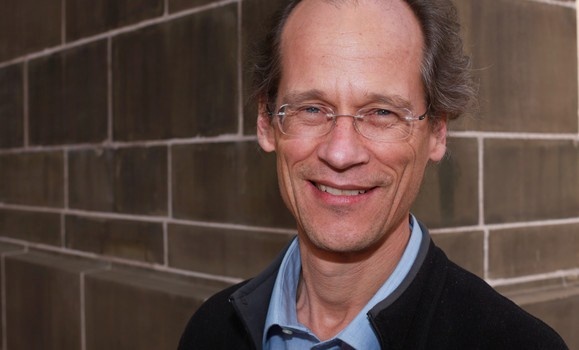Those who think science and creativity are mutually exclusive couldnÔÇÖt be more mistaken: Sherbrooke UniversityÔÇÖs Louis Taillefer is living proof that one cannot exist without the other.
On April 17, ┬ÚÂ╣┤ź├Ż hosted Dr. Taillefer as part of the inaugural Killam Prize Lecture Series. Five Killam Prizes are awarded annually by the Canada Council for the Arts and the Killam Trusts, in Health Sciences, Natural Sciences, Engineering, Social Sciences and Humanities. Funded by Izaak Walton Killam and Dorothy Killam, the Prizes recognize outstanding contributions to research and are among Canada's most prestigious research awards.
Dr. Taillefer received the 2012 Canada Council Killam Prize in Natural Sciences for his research on superconductivity. His lecture, though, was not about equations and formulas: it was all about the creativity thatÔÇÖs inherent in scientific discovery.
Surveying the discoveries of physicists from Isaac Newton to Gilbert Lonzarich (his PhD supervisor at the University of Cambridge) Dr. Taillefer described the importance of an open mind, a strong intuition and a fertile imagination in scientific pursuits. He illustrated this with examples such as EinsteinÔÇÖs intuition about GalileoÔÇÖs experiment that led him to the general theory of relativity ÔÇö or how his ex-colleague Jerry Mitrovica showed an open mind when he explained that the sea level does not rise when the ice on Greenland melts, as commonly assumed, but it falls because the molten ice no longer exerts its gravitational pull on the nearby water.
Dr. Taillefer also explained how a keen sense of observation is often crucial to discovery. ÔÇťI tell my students, ÔÇśLove your data!ÔÇÖÔÇŁ he said. ÔÇťYour experimental data may contain the seeds of a scientific revolution.ÔÇŁ
From ÔÇťfunny wigglesÔÇŁ to discovery
The simple act of looking carefully and not discarding unusual effects has led to great advancements in science. For example, electricity and magnetism were considered to be completely distinct phenomena until 1820 when the Danish physicist Hans Christian Orsted noticed that a change in the electric current flowing through a wire deflects the needle of a nearby compass. This observation led to Michael FaradayÔÇÖs law of electromagnetic induction, the basis for our production of electricity.
Dr. Taillefer gave a personal example when discussing his teamÔÇÖs research into superconductivity. In 2007, Taillefer and his team noticed a ÔÇťfunny wiggleÔÇŁ in their measurements of the electrical resistance of a copper-oxide superconductor. Upon further investigation the wiggle proved to be a quantum oscillation ÔÇô the most direct signature of electron behavior. What they learnt from their ÔÇťdialogue with the electronsÔÇŁ led to a change of paradigm in how these superconductors are understood. ┬á
The potential for superconductivity is massive: in its June 2010 issue, the magazine Scientific American identified room-temperature superconductivity as one of ÔÇť12 events that will change everything.ÔÇŁ The reason, explained Dr. Taillefer, is because having a superconducting cable that works at room temperature would revolutionize the way we transmit electricity, enabling, for example, electricity produced by solar cells in the Sahara to be transmitted safely and without loss to Europe.
But, science aside, what drives Dr. Taillefer is his passion for the process of research, fueled by the thrill of discovery.
ÔÇťIntuition is difficult to describe, but we can sometimes feel it very strongly. Follow it ÔÇô it is your best guide.ÔÇŁ The millennia-old human adventure of scientific discovery is grounded in curiosity, intuition and imagination, and it has led to the greatest revolutions in our world and changes in our lives.
ÔÇťHumans are remarkably resourceful, and that gives me confidence in the future of our planet,ÔÇŁ he concluded.

